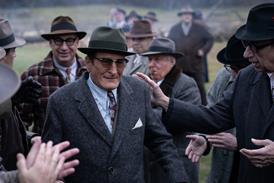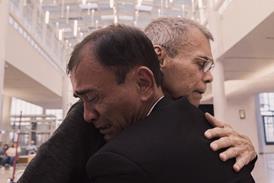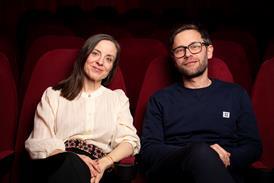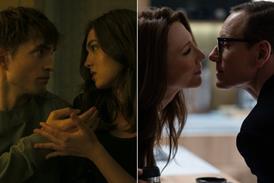Dir: Hirokazu Kore-Eda. Jap. 2006. 127mins.
Rambling, overlong and at times even messy, Hana isnevertheless a delightful surprise from well known Japanese director Hirokazu Kor-Eda. Alwaysidentified in the past with slow, reflective, sad pieces such as Maborosi and philosophicalreflections on human existence like Afterlife- not to mention the heartbreaking NobodyKnows, one of the most moving and desperate films of recent times - Kore-Eda here comes up with a gentle, chiding, humanisticsamurai picture; though the description may be a contradiction in terms, thisis exactly the secret of its charm.
Nicely shot and spiritedlyacted by a large ensemble, featuring among others, such well known Nippon starsas Junichi Okada and Tadanobu Asano, Hana is ideal festival fodder after its Toronto premiere -it also travels to San Sebastian among others - and solid arthousefare.
Embroidering his ensemblepiece around one of the best known legends of honourand revenge in Japanese tradition, The 47Ronin, Kore-Eda goesout on a limb, trying something he has never done before: a historical costumeromp set in the early 18th century, an era of relative tranquility in
He is surrounded by agallery of colorful characters, and though the stories have their dramatic, sadmoments, the prevalent mood, at all times, is light. This does not mean Kore-Eda is any less earnest, and his perceptions any lessrefined, than they were in his earlier films. Though it is certainly not anactual metaphor of the world today, Hana condemns the concept of hate transmitted byinheritance, in whatever shape and form, and goes a long way to ensure theaudience does not miss his anti-violence messages.
After his father's murder, Soza (Junichi Okada) is dispatched by his family to go toEdo (the ancient name for
In the meantime, he haslodged for the last three years, at the expense of his family, in a ramshacklehut in the city's poorest slum, teaching the children to read and write, with afew adults joining in the lessons once in a while. It is there that he finallyfinds the person who killed his father, now a humble porter (Tadanobu Asano)living with a widow and her child.
In the midst of all thismisery - the landlord who is rarely paid is threatening to tear the whole placedown - Kore-Eda puts together an assembly ofpenniless destitutes with a tremendous drive forlife, a richly human congregation which recalls another one of Kurosawa'sclassics, The Lower Depths. They mayhave nothing of their own, not even privacy, but no one can take away theirdreams, or as Kore-Eda's script puts it here, 'toturn shit into rice cakes'.
Among them there is Sada (Arata Furuda),a friend who eats and drinks on Soza's expense andkeeps promising to produce his father's murderer but never does; Osae (Rie Miyazawa) a marriedwoman waiting for her husband's return in the company of her son; and Sode (Ryo Kase), a tough guy whodoesn't believe in war codes but has no problems with war as such.
In addition, in the background,some of the revenge-seeking 47 samurai are hiding in the same dilapidatedtenement, biding their time until the right moment comes to punish the man whocaused their master's death.
While Sozais always kept in the forefront, and his personal moral conflicts oftendirectly affect the lives of the others, Kore-Edaremains close to the ensemble nature of his script, allowing the rest of thecharacters to fully develop on their own.
Junichi Okada has just thetype of innocent look in his eyes that Soza shouldhave, while Rie Miyazawa's features have the cleanpurity revered in Japanese beauty. Meanwhile Asano's forceful presence lendsweight to a role that otherwise is mostly silent, and Furutaplays the hero's resourceful best friend with a relish. Among the supportingparts, Susumu Terajima's hesitant samurai provestouching. The children - and there are quite a few of them in the film - stealthe show every time they come on.
Admirable production design(Toshihiro Isomi worked with Kore-Edaon Afterlife) provided a locationthat could exist 300 years ago, yet has the strangely familiar shape of similarcontemporary poverty stricken areas, whether in South East Asia, Africa or
Alert camera keeps movingaround, usually registering reactions before noticing the actions themselves,and if there is a problem with the editing, it may be because Kore-Eda the editor has indulged too much Kore-Eda the director, whom he should have treated withjust a little bit less consideration.
Production companies/backers
Shochiku
Engine Film
TV Man Union
Bandai Visual
Eisei Gejiko
Storm
International sales
Shochiku
Producers
Shiho Sato
Nozomu Enoki
Cinematography
Yutaka Yamazaki
Editor
Hirokazu Kore-Eda
Production design
Toshihiro Isomi
Masao Banba
Sound
Yutaka Tsurumaki
Main cast
Junichi Okada
Rie Miyazawa
Tadanobu Asano
Arata Furuta
Teruyuki Kagawa
Susumu Terajima
Siji Chihara
Ryuhei Ueshima
Yoichi Kimura
Tomoko Tabata


















No comments yet